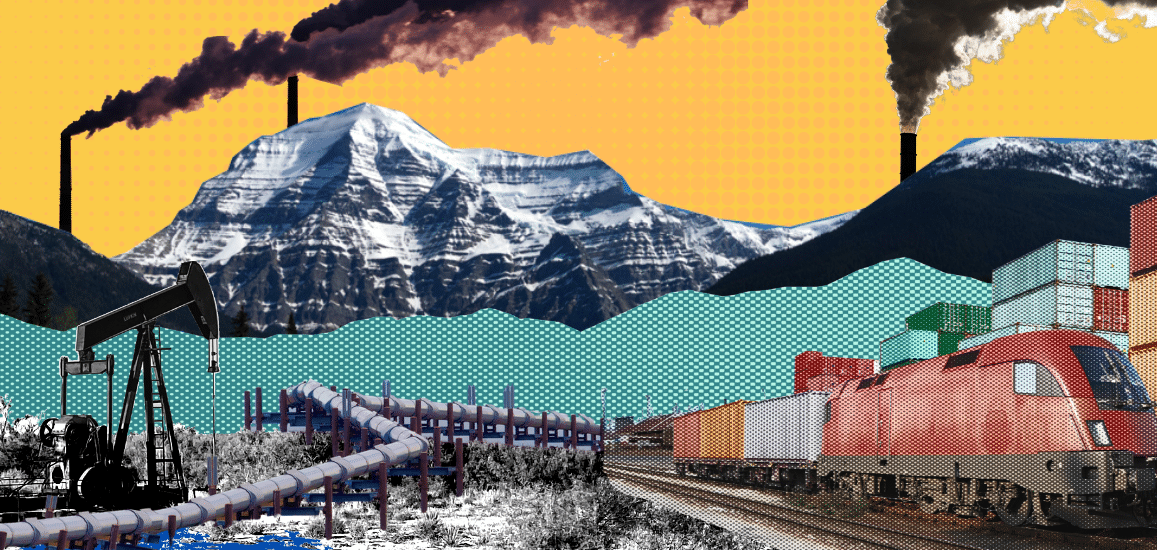The report is also missing information about how the province plans to meet its longer-term targets, as well as those tied to emissions in the oil & gas sector.
VANCOUVER/UNCEDED xʷməθkʷəy̓əm (MUSQUEAM), Sḵwx̱wú7mesh (SQUAMISH) AND səlilwətaɬ (TSLEIL-WAUTUTH) TERRITORIES — On Wednesday Nov. 23, the B.C. government released its 2022 climate change accountability report, revealing that the province is on course to miss two near-term climate targets in 2025 and 2030. The government projects that B.C. will miss its 2025 overall emissions target by 15 percent and its 2030 target in the building and communities sector by at least 35 percent.
In a time of climate crisis, when people in British Columbia are facing unprecedented and deadly heat waves, floods, and droughts, it is unacceptable that the government has failed to plan to meet its near-term climate targets. This failure will worsen the climate crisis and put people in B.C. at risk.
The 2022 report also contains major information gaps. It fails to explain how the province intends to achieve its longer-term climate targets due in 2040 and 2050. And, when it comes to a crucial target in the oil & gas sector due in 2030, the government continues to rely on a “plan to make a plan” — that is, policies that have not been articulated and do not yet exist.
The report also fails to explain the major role of fracking in undermining B.C.’s climate action. LNG Canada, a fracked gas export facility in Kitimat, B.C., is expected to start operations in 2025, leading to millions more tonnes of carbon pollution in that target year and for decades to come. Worse, plans to expand the facility (already approved by B.C.) would make it virtually impossible for B.C. to meet its longer-term targets and commitment to reach net zero by 2050. B.C. simply cannot square its promotion of fracked gas and LNG projects with its climate targets.
These reports have been a sore spot for the government. In March 2022, Sierra Club BC and Ecojustice launched a lawsuit alleging that the government’s 2021 report failed to include plans to make progress towards B.C.’s 2025, 2040, and 2050 climate targets as well as the critical 2030 target for the oil & gas sector. A decision by the court is expected soon.
New premier David Eby has an opportunity to reset B.C.’s approach to climate action and accountability. By acting immediately, Eby can ensure B.C. meets all its climate targets. It is critical that B.C. ban new LNG facilities and commit to phasing out fracked gas in line with climate science.
As we wait for a court decision on whether B.C. is complying with its own climate law, Ecojustice and Sierra Club BC will continue to hold the government to account for getting on track towards its climate targets and staying there in the years to come.
Jens Wieting, Senior Forest and Climate Campaigner and Science Advisor at Sierra Club BC said:
“The 2022 report shines some light on the steps that will lead to reducing emissions in several sectors. But it leaves us in the dark about major gaps and threats on the uncharted path to our 2025 to 2050 targets. A path that will lead us into climate chaos if big polluters like B.C. continue to fail. The biggest elephant in the room is new fracking infrastructure like LNG Canada and the Coastal GasLink Pipeline. Unless stopped, these projects will make it impossible to meet our targets. Ignoring the threat of new LNG projects in these reports won’t make it go away.”
Alan Andrews, Climate Program Director at Ecojustice said:
“This law was meant to deliver a new era of transparency and accountability on climate action. But it took being dragged to court for the Government to admit that they are on course to miss their next climate target.”
“In the middle of a climate emergency, we can’t afford any more missed targets. David Eby must act immediately to get B.C. back on track and show real climate leadership.”
About
Ecojustice uses the power of the law to defend nature, combat climate change, and fight for a healthy environment. Its strategic, public interest lawsuits and advocacy lead to precedent-setting court decisions and law and policy that deliver lasting solutions to Canada’s most urgent environmental problems. As Canada’s largest environmental law charity, Ecojustice operates offices in Vancouver, Calgary, Toronto, Ottawa, and Halifax.
Sierra Club BC is an environmental non-profit working to support people stewarding abundant ecosystems and a stable climate, while building resilient, equitable communities. The organization strives to do this by upholding Indigenous rights and title, reconnecting children and youth with nature, supporting grassroots-led climate action, and advocating for old-growth protection, a rapid shift away from fossil fuels and a just transition for industry workers.

